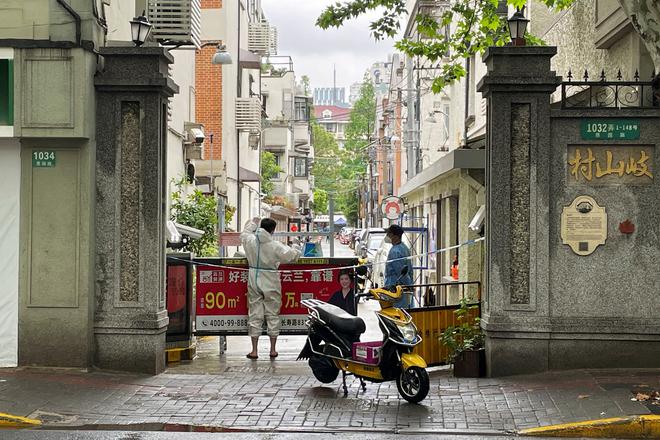
Shanghai erects metal barriers in high COVID streets, apartments
Volunteers and low-level government workers in Shanghai have erected metal barriers in multiple districts to block off small streets and entrances to apartment complexes, as China hardens its strict zero-COVID approach in the metropolis.

Volunteers and low-level government workers in Shanghai have erected metal barriers in multiple districts to block off small streets and entrances to apartment complexes, as China hardens its strict zero-COVID approach in the metropolis.
In the city’s financial district, Pudong, the barriers either thin metal sheets or mesh fences were put up in several neighbourhoods under a local government directive, according to Caixin, a Chinese business media outlet. Buildings where positive cases have been found sealed up their main entrances, with a small opening for pandemic prevention workers to pass through.
China reported 21,796 new community-transmitted COVID-19 infections on Sunday, with the vast majority being asymptomatic cases in Shanghai. Across the country, many cities and provinces have enforced some version of a lockdown in an attempt to slow the spread of the virus.
The latest outbreak, driven by the highly contagious omicron variant, has spread nationwide, but has been particularly large in Shanghai. The city, a financial hub with 25 million residents, has counted hundreds of thousands of cases but fewer than 100 deaths since the outbreak began nearly two months ago.
An AP examination of the death toll found that despite a history of narrow criteria for linking deaths to particular diseases, especially COVID-19, authorities have changed how they count positive cases, leading to wiggle room in how they arrive at a final death count. The result is almost certainly an undercount of the true death toll.
On social media, people posted videos of the new barriers being put up Saturday, with some expressing anger over the measures. The barriers are meant to leave main roads unblocked, Caixin reported.
In one video, verified by the AP, residents leaving a building in Shanghai’s Xuhui district broke down the mesh fence barricade at their front entrance and went looking for the security guard they believed to be responsible for putting it up.
Shanghai is using a tiered system in which neighborhoods are divided into three categories based on their risk of transmission. Those in the first category face the strictest COVID-19 controls and were the main target of the new heightened measures. In the third category, some buildings allow people to leave their homes and visit public areas.
The city’s lockdown has drawn global attention for its strict approach and sometimes dangerous consequences. Many residents in the city have had difficulties getting groceries, resorting to bartering and bulk buying. Others have been unable get adequate medical attention in time, owing to the strict controls on movement.
On Friday, Chinese internet users shared a six-minute video called Voices of April that documents some of the most challenging public moments the city has experienced in the nearly month-long lockdown. One part features audio of residents in one Shanghai community who protested on April 8, screaming: “Send us food! Send us food! Send us food!” in unison.
The video blanketed WeChat timelines before it was abruptly removed by censors Saturday.
Chinese authorities have continued to say that the zero-COVID strategy is the best way forward given low vaccination rates in people over age 60, and that omicron would result in many deaths and severe illnesses if the country ended its strict approach.
Covid clusters emerge in Beijing
China’s capital Beijing has gone on high alert as the situation turned grim following the emergence of clusters of COVID-19, while the country’s financial hub Shanghai reported 39 more deaths due to the virus, the highest in a day so far during the current outbreak since last month.
The Chinese mainland on Saturday reported 21,796 cases, including 1,566 positive cases and the rest asymptomatic cases mostly in Shanghai, Chinas National Health Commission reported on Sunday. Beijing, the seat of Chinas top leadership, went on high COVID-19 alert as the city braced to test some sections of the population after the city recorded 22 new community cases on Saturday.
The city went on high alert after 10 middle school students tested positive for COVID-19 on Friday following which city officials suspended classes in the school for a week.
Pang Xinghuo, deputy director of the Beijing Centre for Disease Prevention and Control, said undetected local transmissions started in the city about a week ago, and involved schools, tour groups and families.
There were hidden transmissions for a week and the infected people came from different backgrounds and a wide range of activities, Pang was quoted as saying by the Hong Kong-based South China Morning Post.


